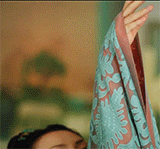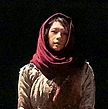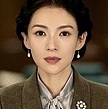Ziyi Zhang Opens Up
The star of Wong Kar Wai’s ‘The Grandmaster’ talks being a role model, finding inner strength, and how being a movie star nothing compared to being a martial artist.
Blockbuster season has received a bit of a blow this year, with movies like Pacific Rim, The Lone Ranger and Man of Steel falling flat, at least as far as the critics are concerned. This being August, it’s a bit late for a dark horse to swoop in, but if there was ever a contender, it might be The Grandmaster, the latest film by Wong Kar Wai. Of course anyone familiar with the Chinese director’s work knows that he is not exactly a king of explosions. And Grandmaster is not your typical action movie: a biopic of sorts about the Wing Chun grandmaster Ip Man (Tony Leung), who was Bruce Lee’s mentor, the movie follows in sweeping, beautifully shot scenes his journey from a North-South martial arts schism through the Sino-Japanese war and his arrival in Hong Kong. Equally present is Gong Er (Ziyi Zhang), a feisty daughter of the reigning Northern grandmaster who dedicates her life to avenging her father’s death.
Tuesday night, at the film’s New York premiere, hosted by the Weinstein Company and sponsored by Deleon Tequila and Dolby, we caught up with Zhang, 34, to chat training, female empowerment and why movie stardom means little to real a grandmaster.
The last time you worked with Wong Kar Wai it was for the film 2046. This is so different. Did you ever think you’d be doing a martial arts movie with him?
No, never. In the beginning he asked me to do this part and he just told me he had some ideas and you will like it. So I said okay. And I joined. I had no idea it would take three years to finish
I was told you did all your own stunts. Did you do very intensive training in preparation?
Yeah. Before we started shooting we took half a year to do the training. And it was like six hours a day. And I had three martial arts masters to torture me. And in the beginning it was so funny, they were so nice and friendly because they thought “movie star!” But after a few days, movie star didn’t mean anything to them anymore. So even when I was crying it didn’t help. But I guess Wong Kar did it because he wanted us to really become martial artists. Sometimes you don’t have to fight, you stand there and you are one. That’s why he wanted us to understand the character more.
One of your breakout roles was in Ang Lee’s Crouching Tiger, Hidden Dragon and I’m sure you had a lot of training for that. How did this compare?
That was my second movie. And I have to say I think now I’ve matured a lot. I understand martial arts more than before. In Crouching Tiger there’s some strength and youth that can never come back because that’s the age.
You’re still so young!
I’m saying that because at that age [Zhang was 21 at the time] I didn’t know much about anything, but I knew I wanted to do a good job because I didn’t want Ang Lee to regret choosing me. Here this character still has that perseverance and the strength inside of the Crouching Tiger character, that’s the similarities. But on the other hand she’s mature, she’s a grown up woman.
It was such a prevailing theme in this movie—the idea that because you’re a woman your character shouldn’t be able to do certain things, like practicing martial arts or avenging your father’s death. Is that a notion you related to in real life?
I think I treasure that part of this movie because first of all, in the film business there are not many parts like this for women. That’s just the reality. We have the ability, we work equally hard as men, why couldn’t we have better roles? And also in real life in China, women have to take care of their husbands, they don’t go to work, they raise the kids. But I think the message Gong Er delivered to the audience isn’t one that only the Chinese audience understands. You guys in America, everybody understands that. I like it when girls are stronger and stronger—they try to know who they are, they try to be independent. That’s the part I like.
What’s next for you?
I’m doing a John Woo movie. It’s a disaster at sea. But not only about disaster because it’s during 1949 and that’s a very special time for China, so it’s a very interesting script.
 Welcome to Zhang Ziyi Infos, your best source for the Chinese actress since 2007. Zhang Ziyi is a famous actress known for her roles in Crouching Tiger, Hidden Dragon, Memoirs of a Geisha, The Grandmaster and so many other great films. Zhang Ziyi recently directed the short film Poem in the anthology film My Country, My Parents. Read her full biography
Welcome to Zhang Ziyi Infos, your best source for the Chinese actress since 2007. Zhang Ziyi is a famous actress known for her roles in Crouching Tiger, Hidden Dragon, Memoirs of a Geisha, The Grandmaster and so many other great films. Zhang Ziyi recently directed the short film Poem in the anthology film My Country, My Parents. Read her full biography 






















